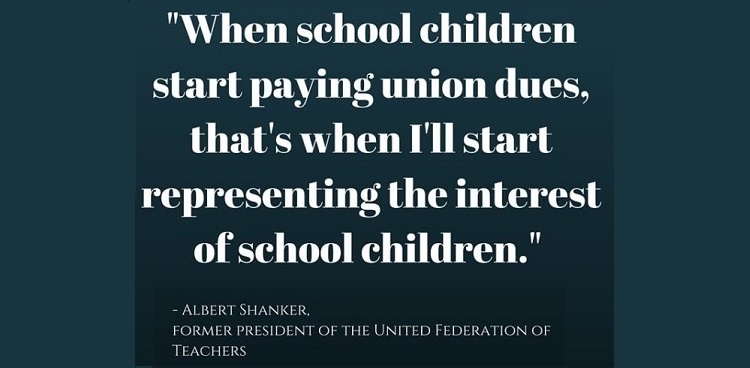
Teacher unions put unions first, not students
Teachers in Detroit went on strike last month — demonstrating once again that union bosses are not nearly as interested in quality education for children, as they are in maintaining the political power of their unions.
Of course, union apologists will argue that what happened in Detroit, where teachers are legally barred from striking, was not technically a “strike.” Instead, according to big labor, it was a “sick out.”
Regardless of what labor leaders want to call it, the end result was the same: Children didn’t receive their education, and taxpayers ended up coughing up more money.
Detroit’s scuffle with the teacher union highlights the fundamental problem with public-sector unionization. In government, as opposed to private enterprise, it’s not just an employer that unions end up striking against — it’s the very citizens who depend on government services.
By their nature, public-sector labor unions — tasked with “protecting” the interests of public-sector workers — are dedicated to growing both the size and cost of government. It’s not necessarily a nefarious conspiracy; it’s simply self-preservation. As the size and cost of government continues its upward trajectory, so do the union’s membership and collected dues.
When there’s a seemingly endless supply of taxpayer dollars to fund government employees, no real organic cap exists on what the unions can, and do, demand. While private businesses are limited by the amount of cash they can earn, governments are only limited by the amount they can tax.
One doesn’t have to be adamantly anti-union to recognize the conflict this poses for taxpayers depending on expensive government services. That’s why Franklin D. Roosevelt — one of the Democratic Party’s most pro-union presidents — warned against letting unions into the public sector.
Teacher unions are no exception to the rule. Like all public-sector unions, they’re working to protect dues-paying positions above all else. And as they’re repeatedly shown, they’re entirely willing to put their financial interests ahead of the education our children need.
Former National Education Association (NEA) General Counsel Bob Chanin unwittingly made this very point in his 2009 NEA national convention farewell address.
“It is not because we care about children, and it is not because we have a vision of a great public school for every child,” Chanin boasted. “The NEA and its affiliates are effective advocates because we have power.”
And how does the NEA obtain that political power?
Through money — money collected from government-funded, dues-paying members.
This self-interested political lobbying that ensues, however, hurts not only the taxpayers whose money funds it. As Detroit shows, the government services are damaged as well.
Children become mere political pawns.
Ultimately, even teachers find themselves stuck in a political process not at all conducive to the kind of inspirational life they wanted to lead.
Teachers deserve our respect and admiration — and they certainly deserve the best work accommodations we can afford. Unfortunately, just as unions disregard the well-being of students and taxpayers, they often forfeit the well-being of educators as well.
Just as union contracts set a “floor” for pay and compensation, they also set a ceiling. Outstanding teachers are regularly reduced to nothing more than numbers on a spreadsheet when it comes time for raises or bonuses. Personal accountability and personal excellence are under-rewarded in a system that extols the collective and repudiates the individual.
Pay increases based on attendance would almost instantly boost teacher/student engagement. The ability to negotiate higher salaries for in-demand subject experts would help cure teacher shortages. Even increased overall pay, in exchange for a downsizing of administrative personnel, is something that could eventually lower overall costs and improve efficiency.
Those are just a handful of suggested reforms for public-sector education — reforms that labor bosses have consistently lobbied against.
Instead, labor bosses regularly focus on fighting for higher taxes, more bureaucratic rules and mandatory membership dues. And yet, through it all, they’ve tried to convince the rest of America that they’re fighting on behalf of educators and students.
It’s time unions are recognized for what they truly are: political operations that view under performing students, struggling taxpayers and rank-and-file members in the very crassest of terms.
Albert Shanker, the longtime president of the United Federation of Teachers union, gave the whole game away when he said, “When school children start paying union dues, that’s when I’ll start representing the interests of school children.”
This publication orginally appeared on Nevada Business.